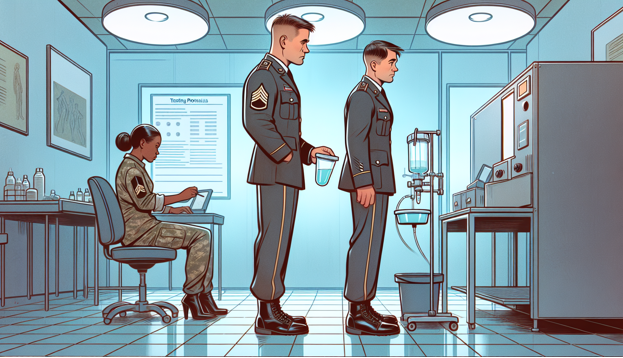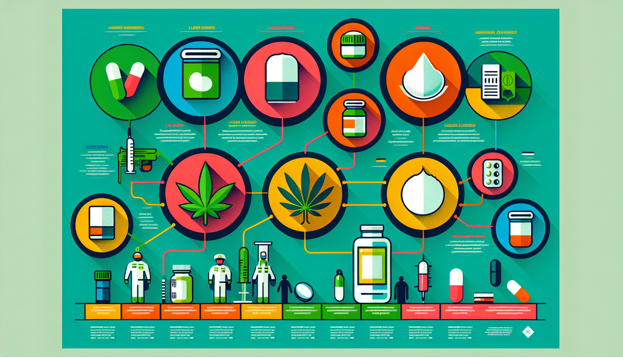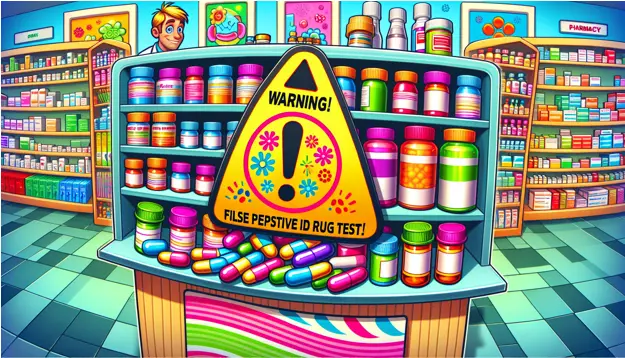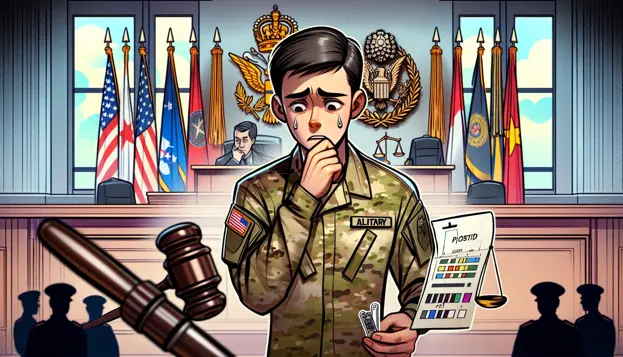updated: 09/16/25
Getting Information and Guidance on Military Drug Testing
The military tests for drugs to ensure service members are always ready for duty, and the rules regarding drug testing for the Armed Forces change in accordance with the emergence of new substances each year.
With this in mind, what drugs does the military test for in 2025?
Our latest resource guide from TriCareRehabs details the specific substances they screen for and the importance of these tests, and is regularly updated. Keep reading for a breakdown of military drug testing protocols, and remember our caring team is here at any time for confidential support!
Key Takeaways
- Military drug testing is designed to maintain operational readiness and safety by deterring substance use among service members, and is updated when needed for new substances.
- A comprehensive drug testing protocol includes urinalysis, blood, and hair follicle tests to detect a wide array of illicit and prescription substances.
- Service members have legal rights to request confirmatory tests following a positive drug test and should proactively communicate any over-the-counter medications taken to avoid undue disciplinary actions.
An Overview of Military Drug Testing Types and Protocols
At its core, the military’s drug testing policy aims to maintain operational readiness and safety. This ensures service members can perform their duties without substance impairment, preserving the discipline and accountability essential to military service. Military drug tests aim to foster a culture of responsibility and safety, not just catch substance users.
Service members are encouraged to participate in substance use education programs to avoid drug use. For those facing challenges, proactive treatment through programs like TriCareRehabs is recommended to ensure they can continue their service without jeopardizing their careers.
Frequency and Randomness of Tests
The unpredictable nature of military drug testing serves as a powerful deterrent, as service members know they can be tested at any time without notice. This randomness helps maintain discipline and readiness.
Drug tests are most often random in nature, though they can also be based on reasonable suspicion. Comprehensive testing protocols include a detailed panel that screens for various substances, ensuring both illicit and prescription drugs are detected to maintain operational readiness.
What Types of Drug Tests Are Used for Military Members?
Urinalysis is the primary method used in military testing for substances, and it is favored for detecting a wide range of drugs. Collected urine samples are analyzed to maintain high standards of readiness and discipline.
Besides urinalysis, the military employs blood and hair follicle tests. Blood tests detect recent drug use within a shorter timeframe, useful in situations requiring immediate results, such as reasonable suspicion cases.
Hair follicle tests provide a longer historical record, indicating drug use over an extended period. This helps identify abuse patterns not evident in urine or blood tests, ensuring a thorough approach to maintaining a drug-free environment.
Employing various testing methods ensures a robust drug detection system, safeguarding the health and safety of the entire force.
What are the Most Common Drugs Detected in Military Tests?
As mentioned above, military drug tests detect a wide array of substances, reflecting the diverse challenges of drug use. A comprehensive 26-drug panel includes substances like marijuana, cocaine, and methamphetamine, ensuring personnel are held to high standards of conduct and readiness.
Drugs detected in military tests are categorized into illicit drugs, prescription medications, synthetic cannabinoids, and designer drugs. Each category presents unique challenges and requires specific testing protocols.
Illicit Drugs Tested for in the Military
Illicit drugs, such as:
- marijuana
- cocaine
- methamphetamines
- heroin
are a major focus of military law and military drug testing. Use of these substances is strictly prohibited and can lead to severe disciplinary actions.
The military also tests for newer synthetic drugs like bath salts, K2/spice, and, in some cases, the military tests for kratom as well. These pose significant risks to readiness and safety, making their detection critical.
Testing for Prescription Medications and Alcohol in the Armed Forces
Certain prescription medications, like opioids and benzodiazepines, can be flagged if not properly documented. Valid prescriptions are necessary to avoid being considered drug abuse.
And although alcohol consumption is permitted among service members, drinking alcohol while on duty is forbidden. As such, alcohol testing for military service members occurs most often following an accident or if suspicion of intoxication occurs.
Does the Military Test for Synthetic Cannabinoids and Designer Drugs?
The military has adapted its procedures to include synthetic cannabinoids and designer drugs, such as ecstasy, to ensure they do not compromise health and readiness. This is, in part, a response to incidents with US servicemen in South Korea using such substances and engaging in questionable on-base behavior surrounding these drugs.
Over-the-Counter Drugs and False Positives
Over-the-counter (OTC) medications can complicate drug test interpretations by causing positive drug tests, potentially leading to unwarranted disciplinary actions.
Knowing which OTC drugs can cause false positives and the steps to take if you test positive is crucial. This knowledge helps mitigate the impact of false positives and ensures fair treatment.
Common Over-the-Counter Culprits for False Positives
Common OTC medications, like cold remedies with pseudoephedrine, can cause false positives for amphetamines. Pain relievers like ibuprofen may lead to false positives for cannabis or barbiturates.
Awareness of OTC medications and their potential effects on drug test results is important. Innocent ingestion can lead to serious consequences if not properly documented and communicated.
Considerations Following a Positive Drug Test in the Military
If a service member tests positive, they should immediately inform their command about any OTC medications taken. This proactive approach can help clarify the situation and prevent unwarranted disciplinary actions.
When a positive result is suspected to be caused by OTC medication, requesting a confirmatory test is essential. These tests use precise methods to validate or refute the initial result, ensuring fair judgment.
Steps to Take If You Test Positive for Drugs in the Military
Service members and military members have legal rights and protections if they test positive for drugs, ensuring fairness and due process. The military is committed to identifying errors and providing avenues for defense.
Knowing your rights and understanding the processes can make a significant difference in navigating the military justice system and military drug testing. Legal representation and appeals provide a robust framework for addressing disputes or inaccuracies.
Your Right to a Confirmatory Test Following Military Drug Testing
If an initial drug test is positive, military protocol requires a secondary confirmatory test to ensure accuracy. These tests use precise methods like gas chromatography-mass spectrometry (GC-MS) to validate positive drug test results.
Service members who believe their positive result is due to OTC medication should promptly request further testing. This step ensures accurate results and addresses potential errors.
What are the Consequences of Testing Positive for Drugs in the Military?
Testing positive for drugs in the military can lead to severe consequences, affecting both immediate and long-term aspects of a service member’s career. Consequences range from administrative actions to severe disciplinary measures.
Understanding potential repercussions and available support, such as rehabilitation programs, can help service members navigate the aftermath of a positive test result.
Administrative Actions
Administrative actions following a positive drug test can include non-judicial punishment, rank reduction, and potential discharge. Non-judicial punishment may involve demotion and loss of pay, maintaining discipline, and upholding standards.
For active service members, failing a drug test can lead to swift administrative and disciplinary measures, emphasizing adherence to substance use policies.
Impact on Military Career
A positive drug test can have significant consequences for a service member’s career. Immediate actions, such as suspension and referral to rehabilitation, can hinder advancement. Proactively seeking treatment through programs like TriCareRehabs is advisable to mitigate these impacts.
Understanding these consequences underscores the importance of complying with military drug policies and proactively managing substance use issues.
Staying Informed About Prohibited Substances
Staying informed about prohibited substances is crucial to avoid unintentional violations. Regularly checking military updates helps service members stay informed about changes in substance regulations.
Service members should be cautious about dietary supplements, as up to 10% may contain banned substances. Vigilance can prevent accidental ingestion of prohibited substances and subsequent consequences.
Getting Proven Substance Abuse Treatment Programs
Substance abuse treatment programs help service members regain fitness for duty. The military and Army Substance Abuse Program (ASAP) assists in reintegration and maintaining readiness after treatment, and participation may be mandated after testing positive.
TriCareRehabs can help find rehabilitation facilities covered by TRICARE policies, ensuring service members receive the support needed to overcome substance abuse issues.
Reach Out to TriCareRehabs Now for Proven Support Options
The goal of our resource was to show how military drug testing is a comprehensive and critical component of maintaining the readiness and safety of our armed forces, and how proactive treatment can be helpful.
From the frequency and randomness of tests to the types of substances detected and the potential consequences of testing positive, understanding these aspects is essential for all service members and applicants.
Staying informed, adhering to military substance use policies, and seeking proactive treatment when necessary can help service members maintain their careers and contribute effectively to their duties.
If you or a loved one is on active duty and facing issues with substances and would like proven, accredited treatment options, make the confidential call to TriCareRehabs now!
FAQs on Drug Testing in the Military
How often are military drug tests conducted?
Military drug tests are conducted randomly or based on reasonable suspicion, making their frequency unpredictable. This approach is essential for maintaining deterrence and operational readiness.
What types of drugs are commonly detected in military drug tests?
Military drug tests commonly detect a range of substances, including marijuana, cocaine, methamphetamines, various prescription medications such as opioids and benzodiazepines, as well as synthetic cannabinoids. This extensive panel ensures thorough screening for drug use.
Can over-the-counter medications cause false positives in military drug tests?
Yes, certain over-the-counter medications, including decongestants and pain relievers like ibuprofen, can indeed lead to false positive results in military drug tests. It is essential to be cautious when using these medications.
What should I do if I test positive for drugs in the military?
If you test positive for drugs in the military, promptly inform your command about any over-the-counter medications you have taken and request a confirmatory test to verify the results. It is crucial to address the situation transparently and seek clarification.
What are the consequences of testing positive for drugs in the military?
Testing positive for drugs in the military can lead to serious administrative actions, including non-judicial punishment, rank reduction, and potential discharge, which can severely affect your military career.
- What Does the VA Foreign Medical Program Offer? - October 13, 2025
- Does TRICARE Cover Military Psychiatric Hospitals? - September 16, 2025
- Does TRICARE Reserve Select Cover Addiction Treatment? - August 12, 2025






